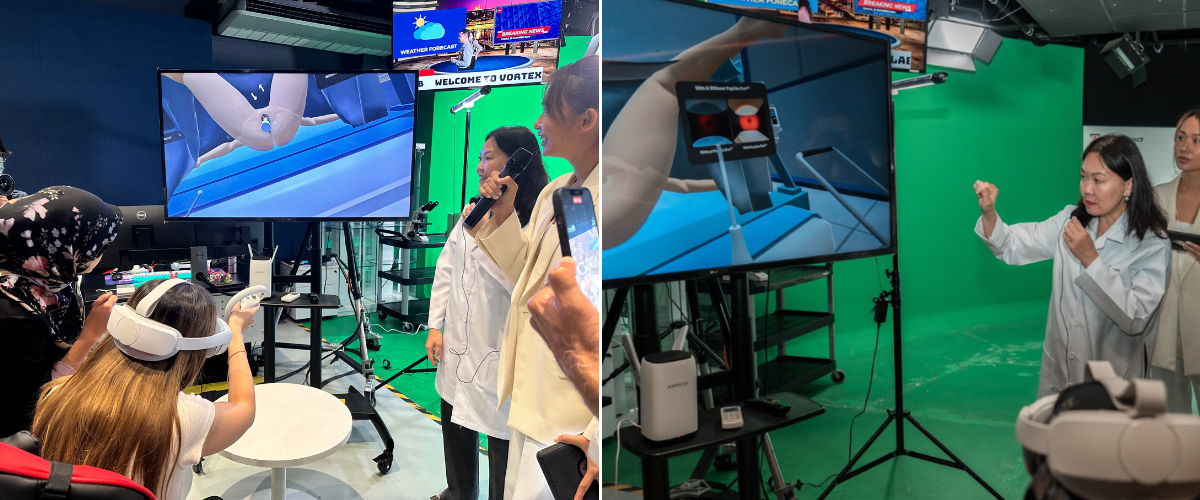Taylor's Impact Labs Develops Innovative Tech To Improve Cervical Screening
Compared to traditional Pap smears, the PapLite Pro™ innovation is less invasive and more precise.
As cervical cancer currently represents the second most common cancer among Malaysian women aged 15 to 44, Pap smear screenings are vital for prevention
However, the main challenge is that many Malaysian women do not adhere to screening guidelines provided by the Ministry of Health, which is to undergo Pap smears once every three years.
During a panel session held at Taylor's University's Lakeside Campus on 8 August, experts revealed two reasons for low Pap smear screenings in Malaysia
The expert panel session included women's healthcare nurse Thulasini Balachandran (far left), Dr Kavinash Loganathan from the National Cancer Society of Malaysia (second from left), Professor Dr Chong Pei Pei from Taylor’s University (second from right), and HPV awareness advocate Maggy Wang (far right).
Image via SAYSAccording to Professor Dr Chong Pei Pei, the director of the university's Digital Health and Medical Advancement Impact Lab, and professor at the School of Biosciences, Faculty of Health & Medical Sciences, Malaysian women have largely refrained from having Pap smears due to a lack of awareness, as well as a sense of discomfort when undergoing a procedure that feels relatively invasive.
In traditional screenings, the lack of illumination more so by shadows cast by the hand of the healthcare professional makes it difficult to obtain endocervical cell samples efficiently. Such scenarios result in extra scrapings within the cervix to obtain enough samples, leading to physical and mental discomfort for female patients.
During an experiential session, using a gynaecological examination manikin, audience members were shown just how many steps constituted a traditional Pap smear and how difficult it was to obtain endocervical cell samples, even with the aid of a speculum and an external light.
The PapLite Pro helps medical professionals conduct Pap smears in a way that limits patient discomfort and improves the visualisation of the endocervix, leading to enhanced precision for cell sampling
An experiential demo session allowed audience members to better understand the advantages of the PapLite Pro tool.
Image via SAYSCurrently in its efficacy testing phase, the PapLite Pro enhances cervical screening by illuminating the cervical canal, which is typically difficult to see during a Pap smear.
Additionally, the integrated light at its tip eliminates shadows cast by the practitioner’s hand, allowing for a clearer visualisation of the endocervix. This innovation facilitates easier and quicker sample collection with minimal discomfort for the patient.
"It is also ergonomically designed for improved ease of collecting sufficient cervical cells from the correct area of the cervix, resulting in accurate diagnostic test results compared to conventional Pap smear tools," Dr Chong said.
Experts hope that the PapLite Pro tool will set a new standard for Pap smear procedures and significantly increase the uptake of Pap smear tests nationwide
During the panel session, Dr Kavinash Loganathan, Research Coordinator at the National Cancer Society of Malaysia, said there were 1,740 new cases of cervical cancer reported in 2020 alone, with a 57% mortality rate.
"These alarming figures are largely due to challenges like cultural stigmas, invasive screening techniques, patient preferences, and lack of awareness, all of which hinder the progress of cervical cancer screening uptakes.
"PapLite Pro represents a potential game-changer in cervical cancer screening for healthcare professionals," he said.
The PapLite Pro prototype was developed as part of Taylor's Impact Labs, which aims to empower communities and address societal issues by bringing about positive change
With 11 labs under the umbrella, the initiative is guided by the United Nations Sustainable Development Goals (SDGs) and works to develop solutions for issues such as clean technology, mental health, poverty eradication, food security, accessible education, healthcare technology, and others.
To learn more about what the labs have achieved, you can access the Taylor's Impact Report 2023 here.



